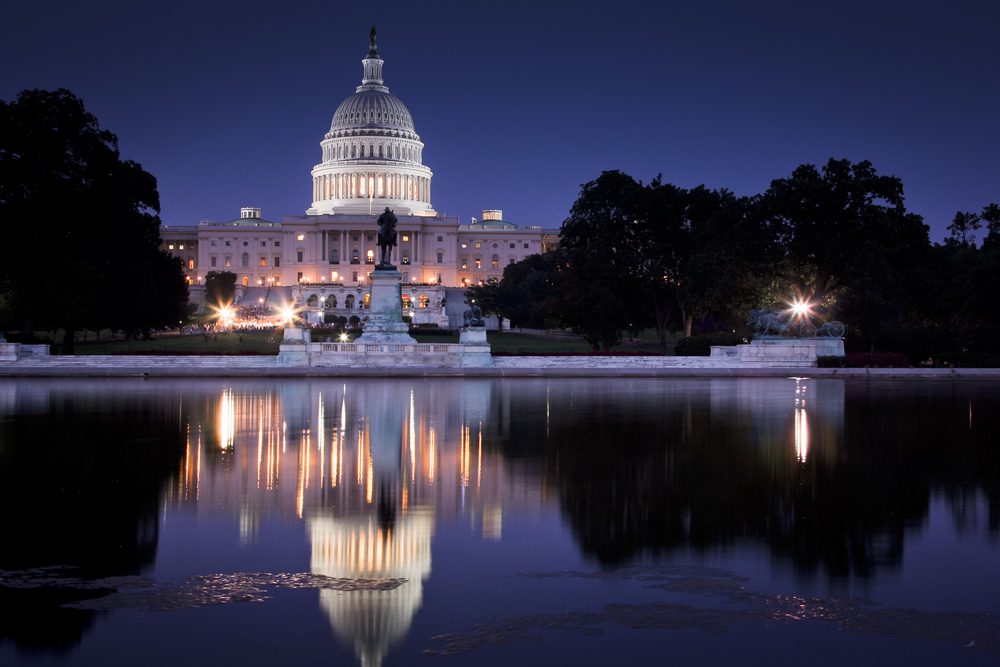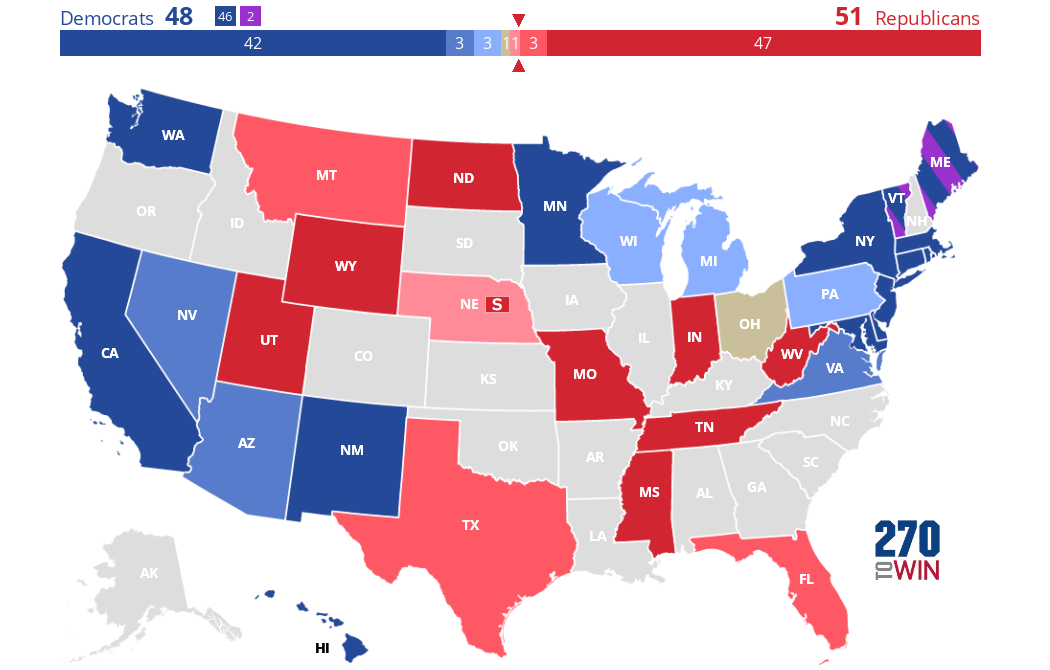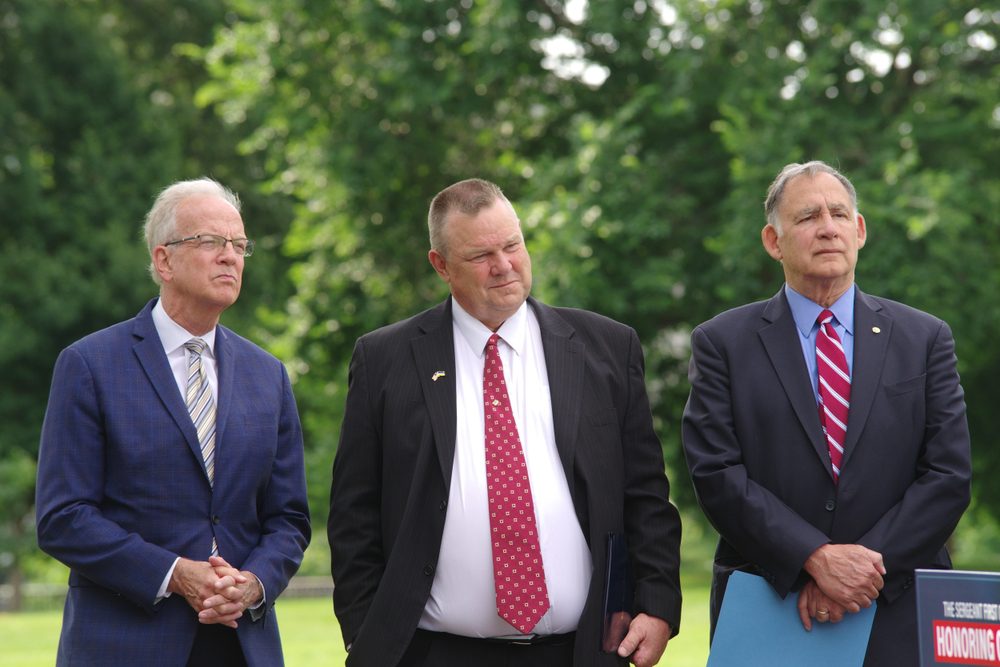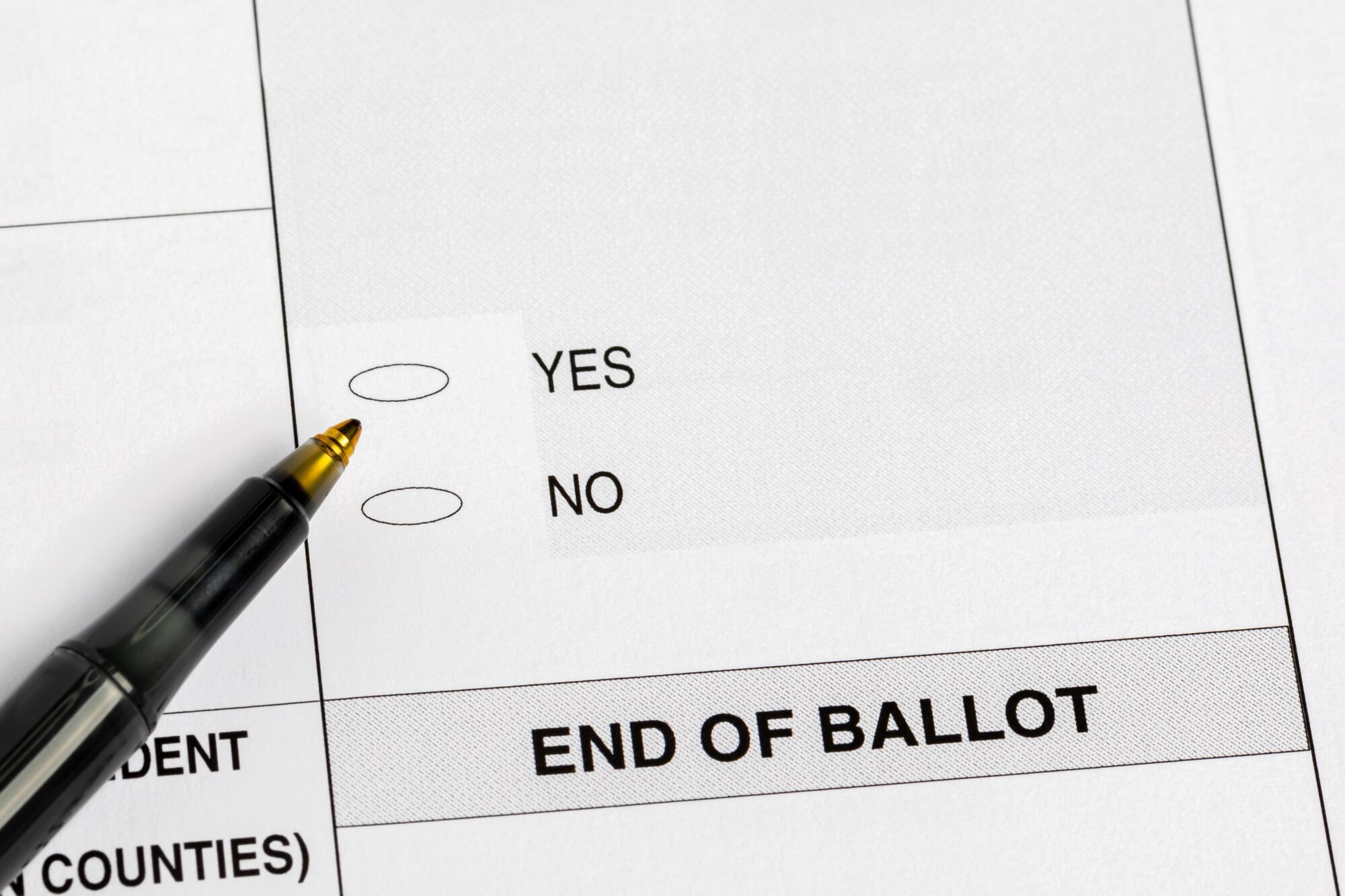
- With 23 seats up for grabs, including several in danger of flipping, Democrats are primarily playing defense this cycle.
While the presidential race remains very much up in the air, it appears increasingly likely that Republicans will wrest control of the U.S. Senate away from Democrats by picking up seats in West Virginia and Montana.
As it currently stands, Democrats hold 47 of 100 Senate seats, but have four Independent Senators who caucus with them — providing a de facto majority, with any tiebreaking vote owned by Vice President Kamala Harris. Republicans hold 49 seats.
RELATED: The Race for the White House
Senators serves six year terms, with one-third of the body elected every two years. This year’s Senate election includes 34 seats up for grabs, including two seats in Nebraska, where a special election is being held. Of the 34 seats, Democrats, or Senators who caucus with Democrats, currently hold 23 of the contest seats. Republicans hold 11.
If Republicans maintain those eleven seats, and add West Virginia and Montana, they will begin the next session of Congress with a 51-seat majority. Four additional pick ups could be in play for Republicans. Democrats face a harder offensive challenge, trying to pick up a seat in Nebraska, Texas or Florida.

The map above displays all the Senate races in 2024. Roger Wicker’s Mississippi Senate seat is among those rated as “safe Republican,” and is demarcated in dark red. “Likely Republican” seats are marked in dark pink and “lean Republican” seats in light pink. Democrat seats follow the same color pattern, with the safest seats appearing in dark blue and “lean Democrat” seats appearing in baby blue. Ohio is marked in gold as a “toss up.” Purple and blue states (Maine and Vermont) are independent seats that caucus with Democrats. Gray states do not have contested Senate seats this cycle.
The Biggest Targets
1. West Virginia

West Virginia Senator Joe Manchin was a unicorn. More “yellow dog” than modern Democrat, Manchin was able to maintain sway in a state that quickly became a Republican stronghold in the 21st Century. For context, Donald Trump won West Virginia with nearly 70 percent of the vote. Every county in the state voted in his favor in 2020.
With Manchin stepping down to create an open seat and popular Republican Governor Jim Justice on the ticket, West Virginia will become a Republican seat. Cook Political Report and The Hill rate it as a “safe Republican” The only poll in the race had Justice up by 34 points.
2. Montana

Democratic Incumbent Jon Tester is in trouble in Montana. Donald Trump won the state with 57 percent of the vote in 2020. Tester’s opponent, Tim Sheehy is a young outsider with both a military and business pedigree.
Sheehy served as a Navy Seal Officer, with deployments in Iraq and Afghanistan. He was awarded both a Bronze Star and Purple Heart for his service. He returned home to found Bridger Aerospace, a company he took public in 2023 on the Nasdaq exchange.
The Hill’s average of polls in Montana puts Sheehy up by more than 7 points, 51.4 to 44.1 percent. Both The Hill and Cook Political Report rate the seat as “lean Republican.”
3. Republican “Toss Up” Targets
Beyond West Virginia and Montana, Republicans are making push in Ohio, Wisconsin, Pennsylvania and Michigan. Ohio, where Democratic incumbent Sherrod Brown is facing a challenge from businessman Bernie Moreno, is a statistical dead heat. In The Hill’s average of polls, Moreno draws 46.4 percent to Brown’s 46.2 percent.
Cook Political Report also rates Pennsylvania and Wisconsin, where Democrat incumbents Bob Casey and Tammy Baldwin are battling for their political lives, as toss ups. Michigan, which falls into the same boat, is an open seat. The Hill’s average of polls puts Democrats in a marginally better position in these three states, rating them as “likely Democrat,” but shows all three as being competitive:
| Toss Up States | Republican Candidate | Democratic Candidate |
|---|---|---|
| Michigan (O) | Rogers – 43.8% | Slotkin – 47.3% |
| Ohio (D) | Moreno – 46.4% | Brown (Inc) – 46.2% |
| Pennsylvania (D) | McCormick – 45.1% | Casey (Inc) – 48.4% |
| Wisconsin (D) | Hovde – 45.9% | Baldwin (Inc) – 48.3% |
Of the “toss ups,” Ohio is the most likely pick up for Republicans. It’s also the only state firmly in former President Trump’s column. The other three states are all battleground states in the presidential. If Trump outperforms expectations in any one of them that could increase the likelihood of Republicans picking up additional seats.
4. The One that Got Away for Republicans
Poor candidate selection hurt Republicans in 2022 Senate races, with losses in winnable races in Arizona, Georgia, and Pennsylvania. It appears Arizona Republicans did not learn their lesson in 2024, nominating Kari Lake fresh off a 2022 loss for governor.

In a state that former President Trump is leading, albeit by narrow margins, Lake is lagging her Democratic opponent, Ruben Gallego, by a fairly significant margin. The Hill’s average of polls puts the race 49.9-42.5 percent in Gallego’s favor.
5. Democratic Targets
With 23 seats up for grabs, including several in danger of flipping, Democrats are primarily playing defense this cycle. That said, the Democratic Party is making substantial investment in Texas, Florida and one of two Nebraska seats.
While appointed Senator Pete Ricketts of Nebraska appears to be on cruise control in his special election, two-term Republican incumbent Deb Fischer is facing a surprisingly strong challenge from union leader Dan Osborn in the Cornhusker state…if polling is to be believed. That’s a big “if” given that much of recently released polling is internal from the campaigns themselves.

Further south in Texas, Republican incumbent Ted Cruz is facing stiff opposition in former NFL linebacker and Democratic Congressman Colin Allred. The Hill’s average of polls has Cruz with a 3.5 point lead, 49-45.5 percent.
In Florida, Republican incumbent Rick Scott is up on Democrat challenger Debbie Mucarsel-Powell by nearly 4 points, 47.2-43.4 percent, according to The Hill’s average of polls.
All three of these seats are still projected “lean” or “likely Republican” by Cook Political Report and The Hill.











